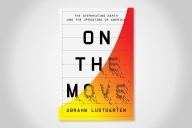You have /5 articles left.
Sign up for a free account or log in.
 The Ministry for the Future by Kim Stanley Robinson
The Ministry for the Future by Kim Stanley Robinson
Published in October 2020
We will be book clubbing The Ministry for the Future with Bryan Alexander through the first week of 2021. So you have plenty of time to read. The book is long but reads short. Concise chapters combined with interspersed doses of science, adventure, economics, action and policy analysis make for a compelling reading experience.
In the book club, Alexander is providing section-by-section discussion prompts. In academia's grand tradition, book club members are only vaguely following guidance -- with most of us talking about whatever is most resonating in the novel. It is a good conversation, and I look forward to participating through the holidays and New Year.
Having just finished The Ministry for the Future, I can attest to the propulsive reading velocity power of mixing book platforms. The force of the novel had me switching between the audiobook (on my phone) for reading during multitasking (dishes, exercise, etc.), the Kindle ebook reader for longer reading opportunities (evenings), and the Kindle iPhone app for short reading bursts. Many of you will savor the novel in paper, although the hardcover version is now temporarily out of stock on Amazon. (How does that happen? Is the physical book findable at local bookstores or other online book-buying sites?)
As you will discover if you read the book and check out the book club, The Ministry for the Future is highly relevant to higher ed.
This is not to say that academia makes too much of an appearance in the novel. We do get some academic glaciologists as central to the plot. But we meet them on glaciers, not in their campus offices.
Come to think of it, professors are mostly absent from the cast of characters fighting the climate emergency in Robinson's mid-21st-century narrative. We get technocrats (the bureaucratic heroes who staff the Ministry for the Future) and bankers (who run the world), but little in the way of academic expertise. Nor does the novel describe the future responses of future universities to climate change.
No matter. We can fill in the higher education climate emergency story.
Beyond vivid descriptions of the effects of rapid planetary warming (heat waves that kill tens of millions, the flooding of Los Angeles, etc.), The Ministry for the Future is really about how we think about the future. Through his world building, the point that Robinson makes is that we all share the cognitive error of overly discounting the future. We give too little weight to both our future selves and much too little to future generations.
The point of the Ministry for the Future (the UN organization that Robinson conjures) is to give future persons (and animals) an institutional ally and even legal standing. If individual consumers and national economies are unwilling to adjust current behaviors, then what is needed is an outside force (such as an organization) devoted to the needs of the future.
While Robinson's Ministry of the Future is an imagined organization, we have real organizations in existence today whose entire rationale is based on future investments. These organizations are called colleges and universities.
Think about it. The education and credentials that we provide students today become valuable only at some future date. Education is an investment in human capital, one with a long payoff.
Research, particularly the sort of basic research that universities specialize in (or at least did in the past), is also an investment in the future. Research findings take years, if not decades, to translate into advances in science, industry and culture.
Are there any organizations on the planet with longer time horizons than colleges and universities? Academic leaders must think across time spans of terms, semesters, years and decades.
While The Ministry for the Future is great fun, the book's power comes from the possibility that we are all rushing toward a climate catastrophe. If we fail to change how we produce and consume energy, there is some probability that very bad things will start happening to the planet and its inhabitants. These very bad things might include deadly heat waves, flooded coastal cities and the decimation of agriculture. Already we are living through frequent extreme weather events (hurricanes, flooding) and seemingly unstoppable wildfires.
What needs to be done to attenuate planetary warming is well understood. Shift from fossil fuels to renewables. Reduce emissions. Moderate consumption.
Colleges and universities would seem to be ideal laboratories for leading an energy transition. We expect to be around for a long time. We can make long-term investments in solar panels and heat pumps and geothermal energy to reduce our campus's reliance on burning fossil fuels for heat and electricity.
Many universities produce all or some of their power for heat and electricity. Converting these campus facilities to renewable sources will be expensive, but it is a process that can be done incrementally. Investing in systems that improve efficiency through insulation or shifting from steam to hot water can also significantly reduce an institution's carbon footprint.
The Ministry for the Future is an argument in the form of a novel. The idea is that all of us need to make choices today as if we were doing so from our children and grandchildren's perspective. This means making trade-offs in the present to benefit the people in the future.
In academia, we are going to have to make some choices related to current versus future well-being. Investing in renewable energy to heat our buildings and power our lights and computers will require trade-offs. Less spending on an immediate need and more investment towards a future payoff.
I hope that The Ministry for the Future, and Bryan Alexander's next book, will ignite a sustained higher ed conversation about academia's response to our climate emergency.
What are you reading?








